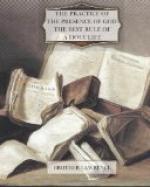That in the beginning of his noviciate, he spent the hours appointed for private prayer in thinking of GOD, so as to convince his mind of, and to impress deeply upon his heart, the Divine existence, rather by devout sentiments, and submission to the lights of faith, than by studied reasonings and elaborate meditations. That by this short and sure method, he exercised himself in the knowledge and love of GOD, resolving to use his utmost endeavor to live, in a continual sense of His Presence, and if possible, never to forget Him more.
That when he had thus in prayer filled his mind with great sentiments of that infinite Being, he went to his work appointed in the kitchen (for he was cook to the society); there having first considered severally the things his office required, and when and how each thing was to be done, he spent all the intervals of his time, as well before as after his work, in prayer.
That when he began his business, he said to GOD, with a filial trust in Him, “O my GOD, since Thou art with me, and I must now, in obedience to Thy commands, apply my mind to these outward things, I beseech Thee to grant me the grace to continue in Thy Presence; and to this end do Thou prosper me with Thy assistance, receive all my works, and possess all my affections.”
As he proceeded in his work, he continued his familiar conversation with his Maker,—imploring His grace, and offering to Him all his actions.
When he had finished, he examined himself how he had discharged his duty; if he found well, he returned thanks to GOD; if otherwise, he asked pardon; and without being discouraged, he set his mind right again, and continued his exercise of the presence of GOD, as if he had never deviated from it. “Thus,” said he, “by rising after my falls, and by frequently renewed acts of faith and love, I am come to a state wherein it would be as difficult for me not to think of GOD as it was at first to accustom myself to it.”
As brother Lawrence had found such an advantage in walking in the presence of GOD, it was natural for him to recommend it earnestly to others; but his example was a stronger inducement than any arguments he could propose. His very countenance was edifying, such a sweet and calm devotion appearing in it as could not but effect the beholders. And it was observed that in the greatest hurry of business in the kitchen, he still preserved his recollection and heavenly-mindedness. He was never hasty nor loitering, but did each thing in its season, with an even, uninterrupted composure and tranquility of spirit. “The time of business,” said he, “does not with me differ from the time of prayer; and in the noise and clatter of my kitchen, while several persons are at the same time calling for different things, I possess GOD in as great tranquility as if I were upon my knees at the blessed sacrament.”




